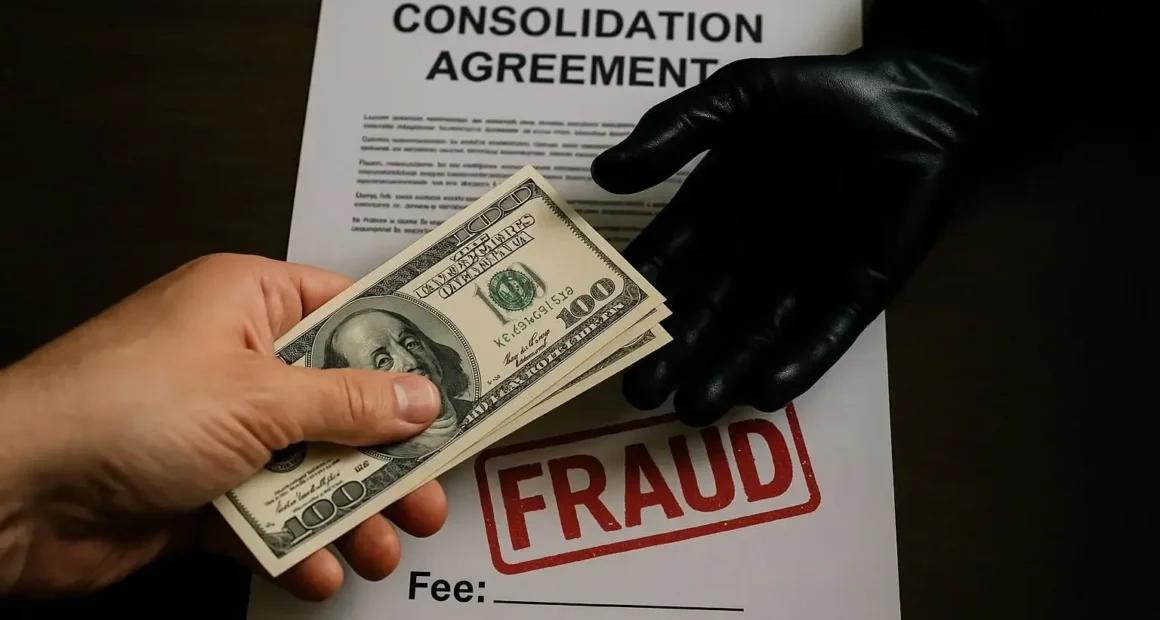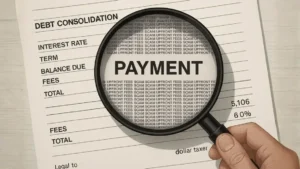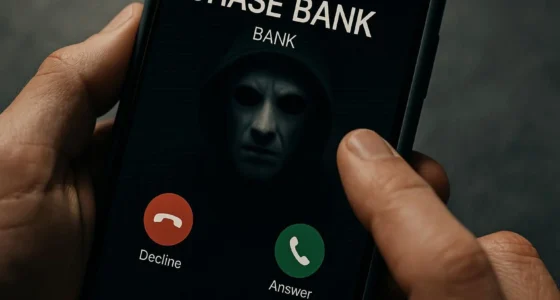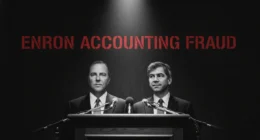When relief turns to nightmare
You owe credit card bills. Car loans. Medical debt. Finally, you see an ad: “One payment. Lower rate. Debt relief.”
That’s where debt consolidation fraud often begins. Companies promise help. Then they trap you in deeper debt while draining your savings.
That trap feels real until it isn’t.
How the scam works
First, they reach out—email, call, or even a flyer. They offer consolidation to combine all debts into one payment.
Then, they ask something weird: “Pay us $300 or $500 upfront for paperwork or processing.”
You pay. They stall or vanish. They charge hidden fees. They might raise your interest or delay payments.
Instead of lightening your debt, they tighten the chains.

Victim story — Nightclub owner
Rene, 41, owns a small nightclub in Texas. He owed $24,000 in credit card debt. He accepted an offer from a debt consolidation company online.
They said they’d get him a 6% interest rate, lower monthly payments. They demanded $650 upfront.
Rene paid via wire transfer. Then the calls went unanswered. His payments to original lenders still came with late fees. His credit score dropped.
Rene lost $650. But now he owes more than $27,000 after fees and penalties. He feels like he traded hope for a trap.
Victim story — Single mom
Tamika, 29, works two jobs. She had $12,500 in debt from medical bills and student loans.
An ad on social media claimed a consolidation service that reduced debts, combined payments. She paid $399 to enroll.
They sent her statements that looked official, but the monthly payments went mostly to their fees. She couldn’t talk to creditors because the “company” told her to stop contacting them.
Her debt ballooned. Her stress crushed her. She now lives with collection calls daily and can’t qualify for small loans.
What regulators have found
The CFPB has warned that some debt consolidation companies misrepresent that they negotiate or reduce debt when they really just collect fees. False promises to stop debt collections or lawsuits appear regularly.
In 2024, the FTC reported that consumers lost over $12.5 billion to various frauds. In many cases, upfront fee schemes played a central role.
One company, Morgan Drexen, Inc., charged illegal upfront fees for debt relief. The court ordered them to refund $132,882,488 plus pay $40 million in penalties.
Another case: Meracord LLC processed payments for debt-settlement firms that charged consumers illegal fees. The CFPB demanded $1.376 million in penalties.
Also, CFPB warned people about callers pretending to be from the CFPB offering consolidation services, requesting credit card info. The bureau clarified—that’s a scam.
Why did the fraud spread
Because desperation reigns when debt piles up.
Because victims hope for fast relief.
Because fraudsters hide behind yield claims and legitimacy masks.
Instead of solving debt, they profit from confusion.
Legitimate consolidation companies never ask for large upfront fees without proof of service. Fraudsters do.
Warning signs — protect yourself
• Company demands fees before service starts. Legit firms deduct fees from your account or loan proceeds.
• They guarantee a drop in interest or total debt. If it sounds too good, it probably is.
• They tell you to stop paying creditors or cease communication. That accelerates fees and legal trouble.
• They use high-pressure tactics, “limited time” offers.
• They refuse to show proof of licensing or contracts.
• Their contact comes unsolicited through cold calls or spam emails.
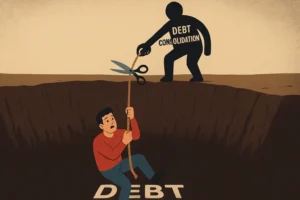
Steps to escape the trap
First, research the company. Look for reviews, licensing, BBB, or state consumer protection database.
Next, ask specific questions: Who owns the firm? What fees? What happens to my payments?
Check with your original lenders. Many allow consolidation or negotiation directly.
Don’t pay upfront fees until you see a written agreement.
Report fraud: call FTC, CFPB, state attorney general.
Haunted futures — what victims face
Years of ruined credit. Collection letters. Lawsuits. Interest rates that double.
They lose jobs or face home loss.
They carry guilt. Regret. Sleepless nights.
Because the promise of help hides predators.
Final warning — what I want you to remember
If someone promises total relief—for a fee before anything happens—they lie.
If they ask for upfront money with vague guarantees, they cheat.
Don’t let debt consolidation fraud make your burden heavier.
Don’t let hope blind you.
Because in this horror, the victim isn’t just your wallet. It’s your future.
Resourses
[3] Consumer Financial Protection Bureau. “Notice about Possible Debt Consolidation Scam.”
Ralated reading(suggested)
Business Loan Scams: Fake Lenders Who Steal Application Fees
Student Loan Forgiveness Scams: Government Imposters Exposed
Credit Repair Scams: Why ‘Fix Your Credit in 30 Days’ Is Always Fake
